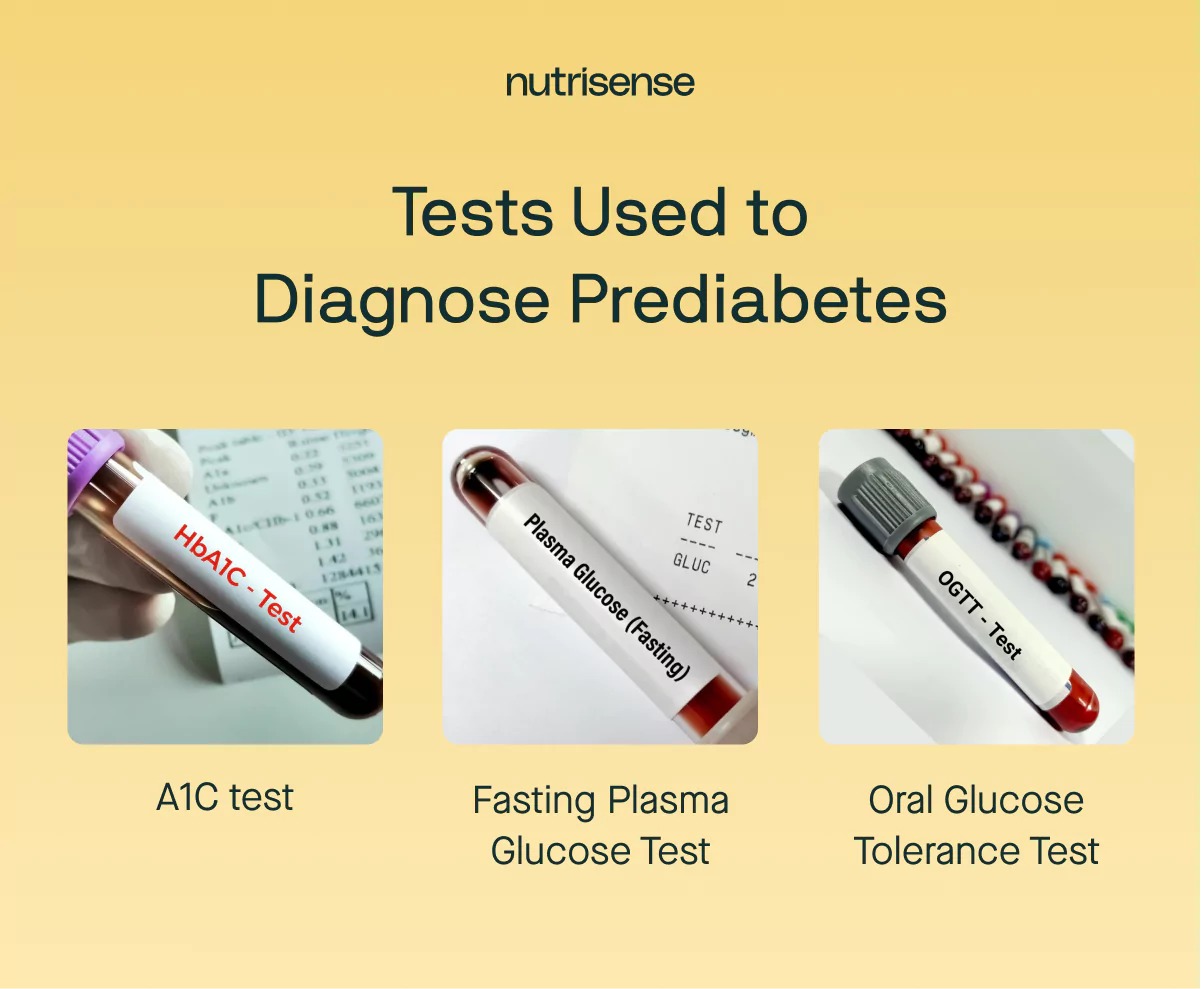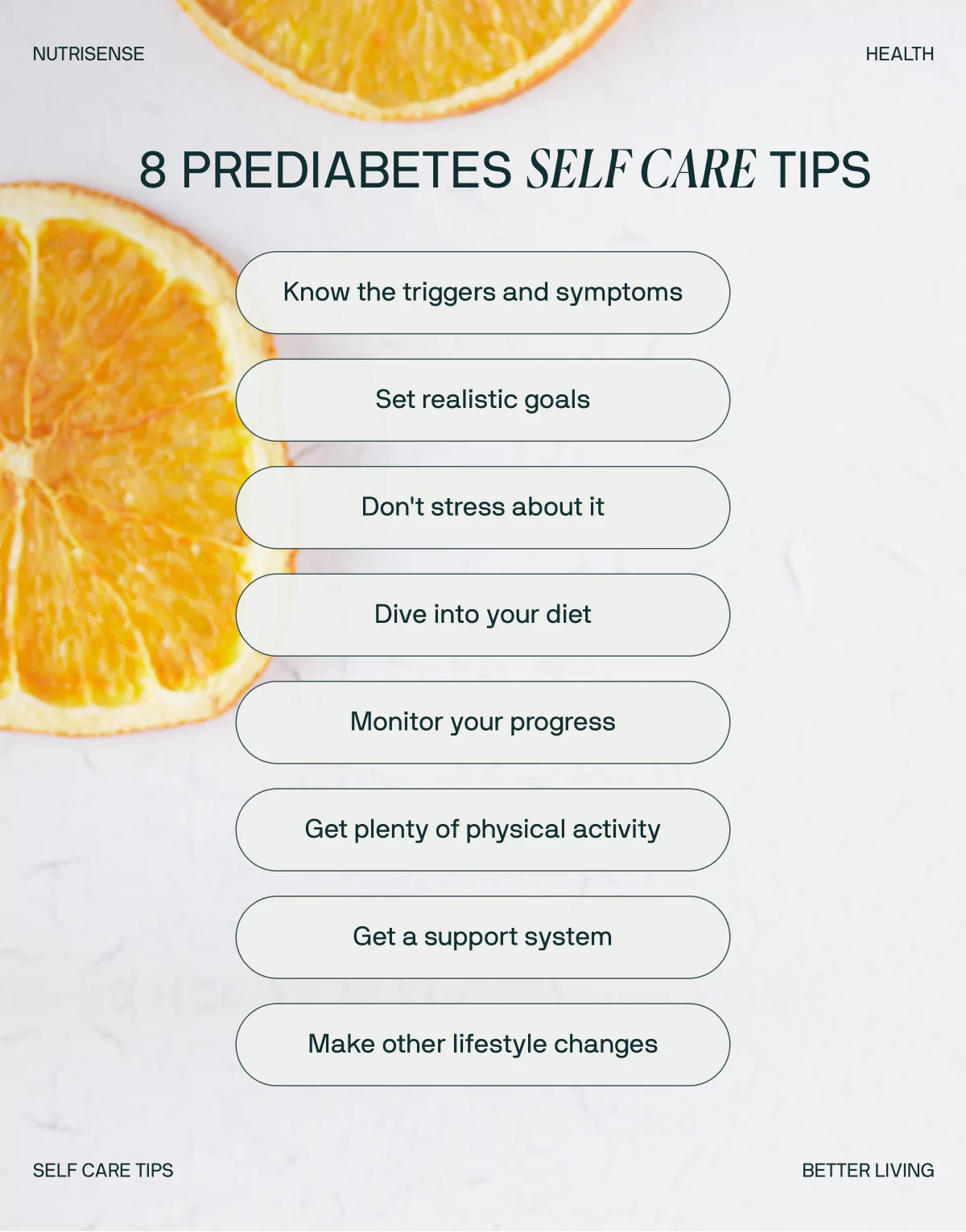Prediabetes Self-Care: 8 Important Tips and Strategies

Key Takeaways
Receiving a prediabetes diagnosis can be a wake-up call, urging you to take charge of your health and make meaningful lifestyle changes. Alongside medical advice from a qualified healthcare provider, incorporating personalized self-care strategies into your daily routine can significantly impact your well-being.
Nutrisense’s nutritionists have compiled a list of eight self-care tips and strategies that can support your individual health goals and empower you to take control of your health after a prediabetes diagnosis. Read on to find out what they are!
What to Know About a Prediabetes Diagnosis
Prediabetes is a condition characterized by higher-than-normal blood sugar levels that are not yet high enough to be classified as type 2 diabetes. A prediabetes diagnosis is an indication that your body is struggling to regulate blood glucose effectively.
Without intervention, prediabetes can progress to type 2 diabetes, increasing the risk of various health complications, such as heart disease, kidney disease, and high blood pressure. Diagnosing prediabetes typically involves blood sugar tests, which assess how well your body processes glucose.
According to the American Diabetes Association (ADA), the following tests may be used to diagnose this condition:

- A1C Test: Your average blood sugar for the past two to three months is measured. A result between 5.7 and 6.4 percent indicates prediabetes.
- Fasting Plasma Glucose (FPG): This is a blood test that measures your blood sugar level after an overnight fast. A result between 100 and 125 mg/dL indicates prediabetes.
- Oral Glucose Tolerance Test (OGTT): After fasting, your blood sugar is measured, and then you consume a sugary drink. Blood sugar levels are checked again after two hours. A result between 140 and 199 mg/dL during the two-hour mark suggests prediabetes.
Some people may have certain risk factors that can increase their risk of prediabetes. While some are beyond our control, like genetics and family history of this health condition, others are influenced by lifestyle choices. Common risk factors include:

- Obesity or being overweight
- Living a sedentary lifestyle or being physically active less than three times a week
- Being older than 45 years old
- Having a parent or sibling with type 2 diabetes
- A history of gestational diabetes
- Being African American, Hispanic or Latino, American Indian or Alaskan Native, Pacific Islander and/or Asian American
Treatment Options for Prediabetes
Treatment options for prediabetes primarily revolve around making lifestyle changes that can lower blood glucose levels and reduce the risk of progressing to type 2 diabetes. For some people, it can even be possible to reverse prediabetes by taking action early.
Potential lifestyle interventions may include things like:
- Healthy Eating: Following a balanced diet that prioritizes adequate protein, non-starchy vegetables, and healthy fats while limiting processed foods and sugary beverages.
- Regular Physical Activity: Engaging in regular exercise, such as brisk walking, cycling, swimming, any other aerobic activity, and strength training exercises can lead to better insulin sensitivity.
- Weight Management: Losing excess weight, if overweight or obese, can significantly improve insulin sensitivity and lower the risk of developing type 2 diabetes.
- Medications: In some cases, doctors may prescribe medications like metformin alongside dietary and lifestyle interventions to help manage prediabetes.
Now let’s get into eight of our top self-care tips to follow if you’ve received this diagnosis.
8 Things to Keep in Mind for Prediabetes Self-Care

Guidance from nutritionists can play a vital role in managing prediabetes and nurturing your well-being. Their expertise in understanding the complexities of nutrition and its impact on blood sugar regulation can provide valuable insights and recommendations for your self-care journey.
Here are eight factors to consider when creating a prediabetes self-care plan, recommended by the experienced nutritionists at Nutrisense:
1) Know the Triggers and Symptoms
Prediabetes is often a silent condition, meaning it may not present noticeable symptoms. However, there are warning signs of prediabetes that can serve as red flags, indicating the possibility of prediabetes.
While symptoms may not be prominent, some people may experience an increased appetite, dry mouth, mood swings, frequent urination, unexplained weight loss, and fatigue. It's important to be aware of these triggers and symptoms to proactively address prediabetes and prevent its progression to type 2 diabetes.
2) Set Realistic Goals

Setting realistic goals can help you maintain motivation and prevent feelings of frustration or failure when adapting to lifestyle changes after a prediabetes diagnosis. Realistic goals are more attainable and allow for gradual progress, consistency, and sustainable lifestyle changes, rather than overwhelming and unsustainable transformations.
Realistic goals also enable individuals to focus on specific areas of improvement, such as dietary changes, weight loss, or increased physical activity, making it easier to track progress and make necessary adjustments.
3) Don’t Stress About It
Excessive stress can have a negative impact on your blood sugar levels, potentially making it more difficult to manage prediabetes effectively. Stress can lead to unhealthy coping mechanisms, like neglecting self-care, impact overall well-being, interfere with sleep quality, and affect mental health.
Here are some effective strategies to help reduce stress:
- Engage in regular physical activity
- Practice relaxation techniques
- Engage in hobbies and activities you enjoy
- Seek social supportBy managing stress effectively, you can support stable blood sugar levels, make healthier choices, and enhance your overall well-being, all of which are important if your goal is to prevent diabetes.
4) Dive Into Your Diet

Since food is the primary factor that influences blood sugar levels, diet plays a huge role when it comes to prediabetes and promoting overall health. By making healthy food choices, you can control the intake of carbohydrates and sugars that can spike blood sugar levels.
A balanced and nutritious diet can also aid in achieving and maintaining a healthy weight, which is important for managing prediabetes. A healthy diet provides essential nutrients and antioxidants that support your health and reduce the risk of complications associated with prediabetes.
To make this easier, you may consider creating a healthy meal plan that you’re able to plan in advance with the help of a registered dietitian or nutritionist.
5) Monitor Your Progress
Tracking your progress allows you to evaluate the effectiveness of your self-care efforts, make necessary adjustments, celebrate your achievements, stay motivated, and maintain accountability. It can also help healthcare professionals assess your progress and provide personalized guidance and support.
Making lists, tracking and recording how you feel, or using an app, like the Nutrisense app, to track your lifestyle changes are all great ways to monitor your progress.
6) Get Plenty of Physical Activity

Regular exercise helps improve insulin sensitivity, allowing the body to utilize glucose more effectively, reduce insulin resistance, and maintain stable blood sugar levels. It also aids in weight management and reduces the risk of cardiovascular complications associated with prediabetes.
The Centers for Disease Control and Prevention (CDC) recommends that Americans get at least 150 minutes per week of moderate-intensity aerobic activity to promote overall health.
7) Get a Support System
A support system provides encouragement, understanding, and accountability, which can positively impact your motivation and ability to stay on track with self-care efforts. Nutrisense offers valuable nutrition support through their team of nutrition experts who can provide personalized guidance and advice tailored to your specific needs.
Nutrisense also provides an online community of members where you can connect with like-minded individuals who are also navigating their prediabetes journey. Having access to such support systems can make your prediabetes self-care journey more manageable.
8) Make Other Lifestyle Changes

There are a few other lifestyle changes in addition to those already mentioned that can support your prediabetes self-care journey and promote better health. But beyond the tips we’ve shared, it’s important to consult your primary care provider for guidance on your unique health needs. Other effective changes can include:
- Getting enough sleep
- Limiting alcohol consumption
- Staying hydrated
- Quitting smoking
By implementing these lifestyle changes and working closely with a trusted healthcare professional, you can take steps to improve symptoms related to prediabetes, boost your overall health, and reduce the risk of developing type 2 diabetes.
Find the right Nutrisense programto turn insight into progress.
Go Beyond Glucose Data with Nutrisense
Your glucose can significantly impact how your body feels and functions. That’s why stable levels are an important factor in supporting overall wellbeing. But viewing glucose isn't enough. Nutrisense, you’ll be able to learn how to use your body's data to make informed lifestyle choices that support healthy living.
One-to-one coaching
Sign up to access insurance-covered video calls to work with a glucose expert: a personal registered dietitian or certified nutritionist who will help tailor your lifestyle and diet to your goals.
Monitor and measure what matters
With the Nutrisense CGM Program, you can monitor your glucose with health tech like glucose biosensors and continuous glucose monitor (CGM)s, and analyze the trends over time with the Nutrisense App. This will help you make the most informed choices about the foods you consume and their impact on your health.
Find your best fit
Ready to take the first step? Start with our quiz to find the right Nutrisense program to help you take control.

Heather is a Registered and Licensed Dietitian Nutritionist (RDN, LDN), subject matter expert, and technical writer, with a master's degree in nutrition science from Bastyr University. She has a specialty in neuroendocrinology and has been working in the field of nutrition—including nutrition research, education, medical writing, and clinical integrative and functional nutrition—for over 15 years.


.webp)

